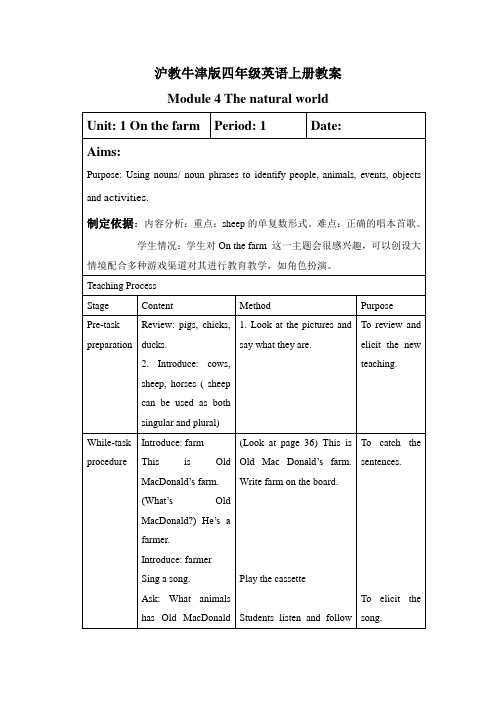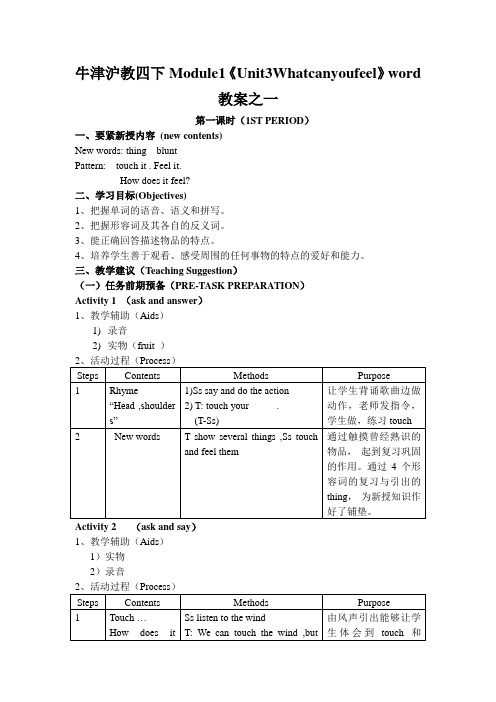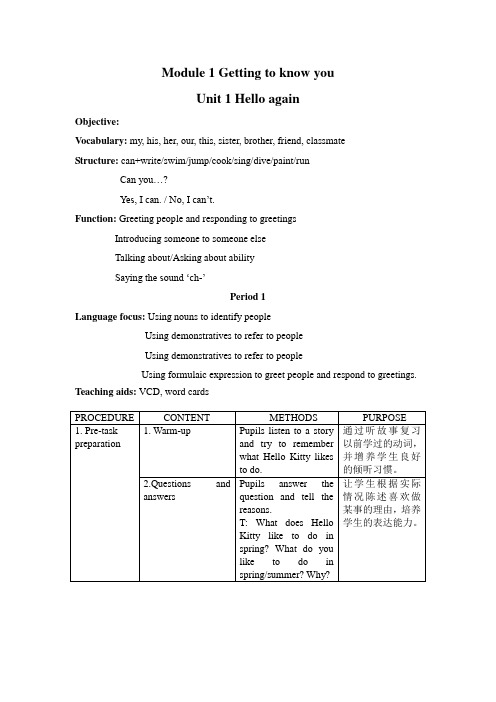牛津沪教四上Module 1《Unit 3 What are you》(period4)word教案
- 格式:doc
- 大小:30.50 KB
- 文档页数:3



The Third Teachi ng Pla nTeach ing aims:Basic aims: ing imperatives to express prohibiti ons.e.g. Don' t play in the pond.2.Asking ‘ How questions to find out the quantity.e.g. How many boys?3.Asking simple questions to obtain ‘ yes/no ' responses.e.g. Do you like this game?Emotio nal aims: Us ing modelled phrases and senten ces tocom muni cati on with the teacher or other lear ners.Develop ing aim: Develop writte n texts by putt ing words in a logicalorder to make meanin gful phrases or senten ces.Key poin ts: 1. Using imperatives to express prohibiti ons.e.g. Don' t play in the pond.2.Asking ‘ How questions to find out the quantity.e.g. How many boys?3.Asking simple questions to obtain ‘ yes/no ' responses.e.g. Do you like this game?Difficulty: Use modelled phrases and senten ces to com muni catewith the teacher or other lear ners.Teaching aids: 1. Student ' s Book 4A page 44.2.Cassette 4A and a cassette player.3.Photocopiable page 484.Toothpicks, scissors and glue.5.Draw ing paper.Preparati on: Make copies of Photocopiable page 48 for each stude nts .Ask ing stude nts to bring toothpicks, scissors and glue.Bring each group of stude nts a piece of draw ing paper.Teach ing procedure:The Fourth Teachi ng PlanTeach ing aims:Basic aims: 1. Using the simple present tense to express interests feeli ngs and opinions. E.g. I like footboot.2.Asking ‘ Whquestions to find out various kinds of specific in formati on about a pers on. E.g. Whose football is this?ing possessive adjectives to show possessi on.e.g. It ' s my football.ing imperatives to express prohibiti ons.e.g. Danny , Peter, don' t play football in the classroom!ing daily expressions to express and respond to apologies. E.g. We re sorry. That' s all right.Emotional aim: 1. Locate specific information in response to simplein structi ons or questio ns.Developing aim: I dentify key words in a structure by recognizingthe stress.Key points: 1. Using the simple present tense to express interests,feeli ngs and opinions. E.g. I like football.ing imperatives to express prohibiti ons.e.g. Danny , Peter , don' t play football in the classroom!ing daily expressions to express and respond to apologies. E.g. We re sorry. That ' s all right.Difficulty: Mai nta in an in teractio n by provid ing in formatio n.Teaching aids: 1. Student ' s Book 4A page 45.2. Cassette 4A and a cassette play.Teach ing procedure:。

牛津沪教四下Module1《Unit3Whatcanyoufeel》word教案之一第一课时(1ST PERIOD)一、要紧新授内容(new contents)New words: thing bluntPattern: touch it . Feel it.How does it feel?二、学习目标(Objectives)1、把握单词的语音、语义和拼写。
2、把握形容词及其各自的反义词。
3、能正确回答描述物品的特点。
4、培养学生善于观看、感受周围的任何事物的特点的爱好和能力。
三、教学建议(Teaching Suggestion)(一)任务前期预备(PRE-TASK PREPARATION)Activity 1 (ask and answer)1、教学辅助(Aids)1)录音2)实物(fruit )Activity 2 (ask and say)1、教学辅助(Aids)1)实物2)录音(二)任务实施过程(WHILE-TASK PROCEDURE)1、新知识的引入(PRESETATION)Activity 1 (Song)1、教学辅助(Aids)录音Activity 2 (compare)1、教学辅助(Aids)实物2)机械性操练(MECHANICAL PRACTICE) Activity 1 (Work in pairs)3)意义性操练(MEANINGFUL PRACTICE)Activity 1 (guessing and feel)(三)任务后期活动(POST-TASK ACTIVITY)1、新知识的运用Activity 1(read and draw)Activity 2 (do the exercises)2、课后作业(ASSIGNMENT)口头:1. 仿照朗读书面:完成书面练习。

牛津沪教四上Module 1《Unit 2 How old are you》(period3)word教案Unit 2 How old are you?The third periodKnowledge objective:1. Learn the words and phrases: ride, ride a bicycle/ horse2. Learn the expressions: Ride your bicycle in the playground, please.3. Ask and answer:- Is this your pencil, Kitty?- No, it isn’t my pencil./Yes, it’s my pencil.- Is this his / her …?- Yes, it’s his / her …. (No, ….)Skill objective:1. Ask and answer the questions.2. Be able to act out the dialogue.Emotion objective:Educate the students to obey the rules in their daily life.I. Pre-task preparation1. Chant: When’s your birthday?2. Answer: What do you do at the birthday party?3. Match the sentences:How old are you, Ted? ( ) Thank you.Here’ s your present. ( ) I’m fine, thanks.Today is my birthday. ( ) He’s seven.How are you? ( ) Happy birthday to you!Can you make a birthday card? ( ) I am eleven.How old is your brother? ( ) Yes, I can.II. While-task procedure(一) Text:1. Read and judge:( ) 1. The boy’s name is Ben Li.( ) 2. Ben is ten.( ) 3. This is Ben’s bicycle.( ) 4. He is riding a horse now.( ) 5. The policeman suggests Ben to ride the bicycle in the playground.2. Learn the phrases: ride a bicycle/ bike; ride a horse3. Read the text after the tape4. Read the text together5. Act out the text6. T: If you’re the policeman, what would you say to Ben?(Ride your bicycle in the park/ …OR: Don’t ride the bicycle. Because you’re too young.)(二) Sentence patterns:1. Read and practice:-- Is this your pencil, Kitty?-- Yes, it’s my pencil. (No, it isn’t my pencil.)(bicycle / Eddie; milk / Wendy; card / Ginger)2. Read and practice:-- Is this his rubber?-- No, it isn’t his rubber.-- Is this her rubber,?-- Yes, it’s her rubber.(desk yo yo telephone toy dog skateboard)III. Post-task activity1. Aaswer the question:1) Is this your car? (yes)2) Is that his ball? (no)3) Is this her blouse? (yes)4) Is this Tom’s parrot? (yes)5) Is that your sister’s bag? (no)2. Read and complete the dialogue:-- Excuse me!-- Yes?-- Is this your schoolbag?-- No, it isn’t. It’s Tom’s schoolbag. Tom’s schoolbag is black. -- Tom! Is this your schoolbag?-- Yes, it is.-- Here you are.-- Thank you.3. Act out the dialogue in the groups of three.IV. Homework1. Listen and read on Page 7.2. Copy the words and the text.3. Act out the dialogue.。

Module 1 Getting to know youUnit 1 Hello againThe third PeriodAims and demands:1. Be able to use interrogatives to ask “yes / no” questions to abtain simple responses.2. Be able to master the pronunciation of the letters: ch, ea.3. Be able to introduce themselves with their abilities.I. Pre-task preparation.1. Chant: I can, you can, everybody can.2. Quick response.Hello, Alice.Alice, this is my friend, Peter.Good afternoon.Can you dive?What can Supergirl do?3. Speaking (检查回家作业)4. Listen and write.My name is Wendy. I’m eleven. I’m a pupil. I can read.I can sing a song. I can swim in the sea. I can fly a kite.I can draw, too. I can draw a cat well. But I can’t cook.II. While-task procedureT: ×××, can you draw?1. Show the sentence pattern:Can you draw? Yes, I can.Can you dive? No, I can’t.2. Work in pairs.3. Read the phrases: sing a song swim in the riverfly in the sky fly a kitedraw a bird read a book4. Learn the sounds1) Read the following and pronunce “ch” “ea”.ch - The chocolate is on the chair.ea - I read 《Blue Sea》at the beach.2) Try to readch - peach, chess, check, cheetea - teach, east, meat, eachIII. Post-task activitives1. Guessing game (play in pairs)Write the verb words in cards and divide into two parts.And practise the sen tence patterns “ Can you …?””yes / no”.2. Rewrite the sentences:1) I can dance. _____ ______ dance? _____, I can.2) I can dive. ______ ______ dive? ______, I can’t dive.3) Super can write. Super can cook. (合为一句)Supergirl can write ______ cook.4) I can cook. What ______ you ______?3. Introduce yourself.4. Homework:1) Listen, read and copy the sentences on P4.2) Write a passage about yourself.。
沪教牛津版四年级上册英语Module4 The natural worldUnit 3 A day in the parkThe third periodKnowledge objectives:1.Be able to use simple present tense to express interests; feelings andopinions:I like footballs.2.Be able to ask “Wh-“questions to find out the owner: Whose ….is this?3.Be able to use imperatives: Don’t….4.Be able to express apologies: We’re sorry.Skill objective:Be able to talk about interests with others.Emotion objective:Educate the students to obey the rules in the classroom or in the school.I. Pre-task1.Chant2.Quick response:(1)Clean the desk, please.(2)Don’t pick the flowers.(3)I’m thirsty.(4)Hi, I’m Danny.(5)I can sing well. What about you?(6)Can you fly a kite?(7)Do you go to school on foot?3.Revision:(1) glove great from flat smell sport thank dream(2)Rewrite the sentences:Here’s a new football. (复数句子)Here ______ some new _______.Walk on the grass. (否定句)_____ _____ on the grass.We can climb the trees. (一般疑问句)_____ you _____ the trees?They’ve got a camera. (划线部分提问)_____ ______ they got?That is Kitty’s dress. (划线部分提问)______ ______ is that?II. While-task1.football(1) Guess: It is round ,It is big. It’s black and white. I can play it with my foot. What is it? (football foot+ball)(2) I like footballs . Do you like footballs?I can play football. Can you play football?2.What are these?(1) Show the things: basketball( basket +ball ); yo-yo; rope ; hoop; ping-pong …(2)Read after teacher: play_____;skip rope3.Danny and Peter are classmates. They have got a football. What are theytalking about? Listen to the tape.4.True of False:( ) Danny has got a new football.( ) Peter likes footballs.( ) Peter can’t play football.( ) They can play football in the classroom.5.Listen and follow the tape.6.Act out the dialogue.7.Make a new dialogue with other things. (yo-yo, rope, hoop and so on) III. Post-task1.Match the sentences:(1) Open the door. A. That’s all right.(2) Thank you very much. B. All right.(3) Give me a pen, please. C. That’s right.(4) I’m sorry. D. You’re welcome.(5) We can’t draw on the wall. E. OK. Here your are.2.Choose the best answer:( )(1) We like _______.A. footballB. footballsC. a football( )(2) Don’t play ______ in the classro om.A. footballB. footballsC. the football( )(3) I can play _______well.A. pianoB. pianosC. the piano( )(4) Don’t run. You can run ____ the playground.A. onB. inC. at( )(5) Here_____ some sugar and here_____ some sweets.A. are…areB. is…isC. is …are3.Rules for our classroom or for our school.Homework:1.Act out the dialogue or make a new dialogue.2.Write down at least 5 sentences, about rules for our classroom or for ourschool.。
Module 1 Getting to know you
Unit 3 What are you?
The fourth period
Knowledge aims
1. New sentences: What am I? You’re a …. Are you a…? Yes,/No, I’m….
2. New words: pilot, writer
Skill aims:
To be able to talk more about jobs with others
Emotional aims:
To learn more about jobs and to know what they want to be in the future then to study
hard to realize their dreams.
Teaching procedures:
Pre-task preparation:
Rhymes.
Play a game: Who has the best memory?
To let them see twelve jobs on twelve cards for about half a minute. Then turn over
the cards. And ask students what job is behind each card.
Ask and answer
T: What does your father do? Can he draw?
What does your mother do? Can she speak English?
What does her Grandma do? Can she dance?
What do you do? Can you read?
Revision on jobs.
(1)Introduce one of your family members. Say something about his/her job and so on.
(2) Ask and answer according to the introduction.
E.g. What does Betty’s father do?
What can he do?
Is he tall?
While-task procedure:
New sentences learning
1. What am I? You’re….
Elicit
T: Look! I have a gun. I am wearing dark blue uniform. What am I?
P: You’re a policewoman.
T: Yes, I’m a policewoman.
(T shows the sentences) Read the new sentences.
Work in pairs
P1: What am I?
P
2
: You’re a driver.
P1: Yes, I am a driver.
2. Are you a…?
Elicit:
(1) Ask students to take turns to choose a card and act.
P1: What am I?
T: Are you a dentist?
P
1
: Yes, I’m…/No, I’m…
(2) (Show the sentences) students read after the teacher
(3) Listen to the tape, read after the tape.
(4) Work in groups. Play a game. What am I?
II. New words.
pilot, writer
1) Show the pictures with some words those are not completed.
_ _ lot writ_ _
Look,they are my friends. What are they? Let me tell you they are pilot and writer.
Please complete the two words.
2) Listen and complete.
3) Read
4)Try to say something about these jobs.
Post- task:
1.Read the four new words.
2.Quick response to the four words according to pictures.
3.Draw a picture that what you want to be in the future
4.Let others to guess what you want to be with the new sentences we’ve learned.
What am I? Are you a …? Yes, / No, …..
5. Try to introduce yourself in the future.